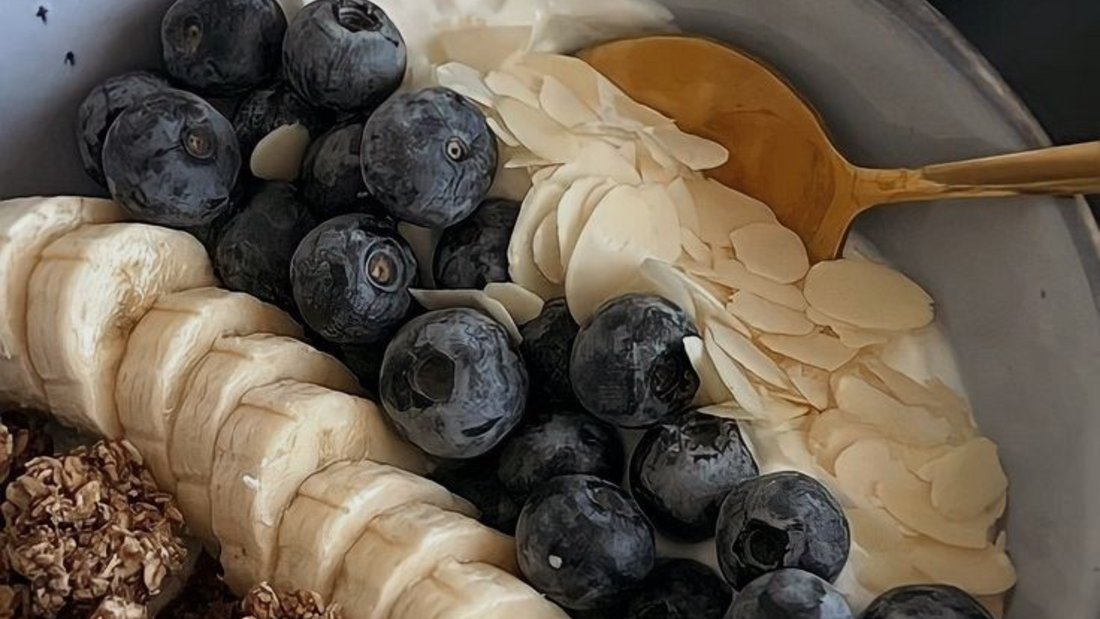
Eczema & Diet: What You Eat Can Help (or Harm) Your Skin
Share
Eczema is a common skin condition often treated with creams and ointments. But did you know that diet can also affect your skin? By avoiding certain foods and increasing your intake of others, you may be able to reduce eczema symptoms.
What is eczema?
Eczema is a collective term for skin conditions characterized by redness, itching, and inflammation. It is chronic, meaning symptoms can persist or recur. Common forms include:
- Constitutional eczema (atopic eczema) – often hereditary, sometimes already visible in the first months of life, often in combination with allergies such as hay fever or asthma.
- Contact dermatitis – caused by contact with irritants or allergens such as nickel.
How does eczema develop?
The cause is often a combination of genetic predisposition, a disturbed skin barrier and environmental factors such as heat, perspiration, soap, dust mites or certain foods.
A compromised skin barrier allows more moisture to escape, causing the skin to dry out and become more vulnerable. Substances penetrate more easily and trigger inflammatory reactions.
The role of the gut microbiome
Your intestines and skin are connected through the immune system. People with eczema often have:
- Less diversity of good intestinal bacteria.
- A permeable intestinal wall ('leaky gut').
Good bacteria such as Bifidobacterium and Lactobacillus produce substances (such as butyrate) that can inhibit inflammation and support the skin barrier.
Food allergy and eczema
Food allergies or intolerances can trigger or worsen eczema symptoms. Common triggers include:
- Gluten (wheat)
- Cow's milk
- Eggs
- Peanuts, soy
- Fish and shellfish
Foods that can aggravate eczema
-
Processed and refined products
Low in nutrients, rich in sugars, unhealthy fats and additives (such as E621) that can promote inflammation. -
Omega 6 in excess
Vegetable oils (sunflower, corn, canola), margarine, meat, and processed foods can disrupt the omega-6/omega-3 balance and promote inflammation. -
Nightshade vegetables
Tomatoes, bell peppers, eggplant, and potatoes can aggravate symptoms in some people (possibly due to solanine). -
Histamine-rich foods
Think of aged cheeses, pork, tomatoes, spinach, chocolate, citrus fruits and alcohol.
Foods that can support the skin
-
Fresh, unprocessed and organic
More vitamins, minerals and antioxidants, fewer pesticides and additives. -
Probiotic-rich food
Sauerkraut, kefir, kimchi, kombucha, miso and other fermented products nourish your intestinal flora. -
Fiber-rich diet
Vegetables, fruits, nuts, seeds, whole grains and legumes feed the good gut bacteria. -
Omega 3 fatty acids
Oily fish (salmon, mackerel, herring) and plant sources such as linseed, hemp seed and walnuts help reduce inflammation. -
GLA (gamma-linolenic acid)
Evening primrose oil and borage oil support the skin barrier and reduce inflammatory activity. -
Anti-inflammatory foods
Blueberries, blackberries, cherries, garlic, turmeric and ginger have a proven beneficial effect on inflammatory processes.
Finally
Diet can't always prevent eczema, but it can make a significant difference in the severity and frequency of symptoms. Because triggers vary from person to person, it's important to work with a health professional to discover which foods support your skin and which aggravate symptoms.
Optemuse tip for eczema and skin support
Want to strengthen your skin from the inside out? Then consider our:
- Probiotic Support – for healthy intestinal flora and a strong immune system.
- Omega 3 – for an anti-inflammatory effect on the skin.
- Collagen Mix – with nutrients for a healthy skin barrier and a natural glow.
This way you work specifically towards less inflammation and healthier skin, from within.
